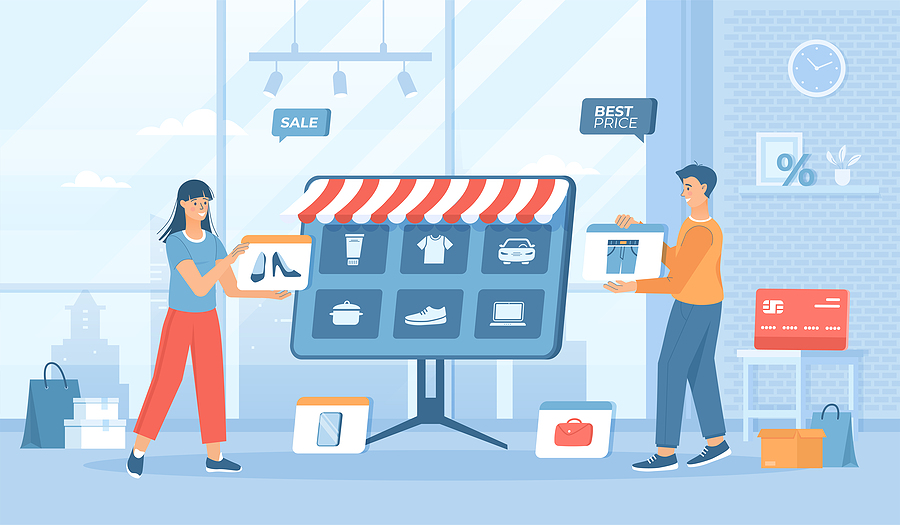The Power of Ecommerce Personalization: How Customized Shopping Experiences Boost Sales

In the highly competitive world of online shopping, you need any edge you can get to stand out from the crowd and deliver exceptional customer experiences that keep them coming back for more. It doesn’t have to be fancy — it just has to work, which makes ecommerce personalization the perfect place to start. Ecommerce personalization is a proven tactic that can help you distinguish your brand from the competition, not to mention boost customer engagement and drive more sales along the way. Best of all, you can do as much or as little as your budget and bandwidth allow.
Despite the lack of face-to-face interactions in most online shopping experiences, there are still ways for sellers to add a personal touch. Whether you include a customer’s name in an email or create a website experience unique to each shopper, going beyond the basics to make consumers feel seen will be rewarded.
What Is Ecommerce Personalization, Anyway?
Ecommerce personalization is the umbrella term for all the strategies online retailers use to create tailored shopping experiences for consumers. By using data analysis and customer insights, sellers can deliver curated product recommendations, marketing messages and more based on a shopper’s browsing and purchase history and demographic information. As a result, consumers have unique, relevant journeys that drive them to buy.
With today’s technology, everything from the look of your online store’s homepage to the content of a branded email can be personalized and made most attractive to the shopper on the receiving end. Personalization ultimately improves the customer experience, and there are long term benefits of increased loyalty and retention. Shoppers also prefer it — nearly 70% feel frustrated by impersonal shopping experiences. Overall, it’s favorable to both shoppers (who feel understood by your brand) and to online retailers (who see more revenue).
Now that you know the goal and perks of ecommerce personalization, let’s take a look at how some of the specific strategies boost sales.
Recommended Products Increase Average Order Value
Every seller knows how difficult it is to capture shoppers’ attention, so it’s important to maximize every sale whether the customer is new or existing. A recommendation engine can help by suggesting products to shoppers based on their browsing (or purchase) history, which they can easily add to cart and increase their order value. This is a perfect example of a customized shopping experience that boosts sales.
Nobody does recommended products like Amazon, which sees at least 35% of its revenue come from its recommendation engine. But you don’t need to be an ecommerce behemoth to add a “Recommended For You” section to your website and emails. More than half (54%) of ecommerce sellers cite product recommendations as the key driver of higher order values. There are plenty of extensions you can add to your online store that will track browsing behavior and make the suggestions for you.
Personalized Emails See Higher Open & Click-Thru Rates
Experts generally agree that the average person receives around 120 emails per day, not including spam. That’s a lot of noise for anyone to sift through, and it’s easy to let your online store’s emails get lost in the shuffle. However, with a bit of personalization, you’re far more likely to get a click or even a sale. Take a look at some of these email personalization statistics to back up this claim:
- Personalized promotional emails see 27% more clicks than their non-personalized counterparts.
- Brands can improve open rates and CTRs by 35% just by addressing customers by name in emails.
- Segmented and personalized emails generate 58% of revenue.
- Nearly 40% of online retailers are sending emails with recommended products.
- Personalized emails are 40 times more effective at capturing new customers than social media ads.
With higher open rates and more clicks to your website, you’re guaranteed to see more sales.
Dynamic Pages Captivate Shoppers
Showing every single shopper the same website is so late 2000s. Dynamic websites, or websites that can change their content and layout based on user input or data, are gaining traction for online retailers who want to create highly customized shopping experiences.
For these sellers, dynamic websites can be incredibly beneficial. By using dynamic website technology, online retailers can create personalized web pages and content for individual shoppers based on their preferences, behavior and purchasing history. For example, a dynamic website can display product recommendations that are tailored to the shopper’s browsing history, show relevant promotions based on their geographic location or offer customized pricing based on their loyalty program status.
Special Occasion Coupons Bring Unexpected Joy and Off-Season Sales
One simple way to add a personal touch to your store’s shopper experience is to send customers personalized coupons to redeem with their next purchase. Birthdays, anniversaries and referral milestones are all occasions worth celebrating, and generating custom coupon codes is a low-lift practice that can make a big impact.
Customers love discounts, if the 337 million promo codes redeemed in 2021 is any indication. Unless you’re just starting out in ecommerce, you probably have too many customers to keep track of these milestones by hand. An ecommerce CRM will act as your digital Rolodex so you can organize customer information like purchase history, shipping address, birthdays and more — plus notifications that will ensure you never forget to take action.
Relevant Ads Are More Positively Received
Retargeting, also known as remarketing, is nothing new for most online retailers. If you need a refresher: The tactic involves using technology to identify potentially interested shoppers and then showing them your marketing messages even after they’ve left your website. This means shoppers are seeing relevant ads that are customized to their online browsing experience.
Research shows remarketing is a powerful strategy that will drive sales time and time again:
- 37% of shoppers click a retargeted ad because of the appeal of the product in it.
- There’s a 70% chance a consumer will convert after returning to your website.
- 27% of online retailers use retargeting, and it reduces cart abandonment by 6.5%.
Why does remarketing work so well? It adds a personalized element to the web. Rather than showing thousands of consumers the exact same message and image, like a billboard does, each consumer sees the product(s) they were looking at previously. Your products and brand stay top of mind so when they’re ready to purchase, your online store is the first destination.
More Ideas for Ecommerce Personalization
Customized shopping experiences can be as simple or as complicated as you want it to be, and a little can go a long way. Take these examples for easy ecommerce personalization:
- Include a short handwritten note thanking the customer for their purchase.
- Segment your marketing (email, postcard or otherwise) so customers receive relevant messages.
- Provide personalized customer support, including addressing customers by name.
- Use custom packaging if it makes sense, such as using Marvel wrapping paper if a customer has ordered a product featuring one of the characters.
No matter which route you take to add personalization to your business, it’s the key to delivering exceptional customer experiences in ecommerce. By leveraging technology and implementing personalization strategies, you can create an engaging and customized shopping experience that will boost your bottom line — we promise.

Share On:








